- Home
- Matt Forbeck
Amortals Page 4
Amortals Read online
Page 4
It was my turn to shrug. "Three didn't care much for the government. Those were hard years, and he was out there protesting the Pacific Rim War."
I gazed out over the tombstones spreading away from me in all directions. The cemetery had grown so much since I was a boy. There were huge parts of it I couldn't even see. "He wasn't much older than you, but to him I represented the establishment. He hated me for that, and I never could talk any sense into him."
"Three?" Querer asked.
"That's what the family called him when we got together. Too many Ronans around otherwise."
The kid got up into my face. "What about Four and Five?" he asked. "Why didn't you ever talk with them? Greatgrandpa's been gone a long time."
He didn't voice his real question: "What about me?" But I heard it anyhow.
"I–" I started to explain that it was just easier not to deal with it. For a pacifist, Three kept strict control over his kids. I never got to say a word to Four in his entire life. I'd met Five, but just in passing.
None of that really mattered now, especially to the kid standing before me at that moment. To him, I'd been a foolish old man who'd let his family get away from him, and I couldn't really tell him he was wrong. There was only one thing I could say.
"Six." I looked him in the eyes to see how he'd react to that name. A ghost of a grin crossed his lips. "I'm sorry."
The grin grew. He reached out and pulled me into an embrace that made me realize that my new body wasn't all that much larger than his. Apparently my offspring had been breeding well. I hugged him back.
"Hey," Querer said, finally holstering her gun, "if he's six generations down from you, how come he's Ronan Dooley the Sixth? If you're the first, shouldn't he be the Seventh?"
"My son's name was Cal. He named his boy Ronan the Second."
"To honor you?" Querer said.
I nodded. "That was back when the family members who were still alive would speak to me."
She grunted. "I don't think the rest of them hated you as much as you believed."
"How's that?" said Six. "My dad told me to never try to meet Grandpa."
"Sure," said Querer, "but he named you after him anyhow."
CHAPTER FIVE
After Querer finally put her gun away, she insisted on hauling me off to the DC Police Station right away. I went along with that, but only after whispering a few private words over Colleen's grave.
Six begged me not to tell his father about coming to see me. I consented to that, but I made him promise to catch up with me later. "Once this murder investigation is over, I should be able to make plenty of time," I said. "I have something like a decade of unused vacation."
"In the meantime," said Querer, "you have an engagement at the White House tonight, so let's move."
I gave Six a hug. "Thanks," I told him.
"For what?" he asked, as I followed Querer back to the hovercar.
"For being braver than me," I called back over my shoulder.
He stood there and waved good-bye as the autopilot pushed us into the air and sent us scudding away over the cemetery and toward downtown DC. I didn't feel much like talking, and Querer didn't push me. I just stared out the window and watched the city slide by below us.
DC had changed a lot since I had first come to the city back in the 1980s. The zoning code that no building could stand higher than the Capitol's dome, though, had stayed the same for most of that time, despite the fact that the city's population had grown by orders of magnitude since that law had been laid down. For decades, this meant that the DC metro region had sprawled far outside of its original borders. Since the developers couldn't build up, they had to build out. Commutes took hours to get people from the places they could afford to live to the places they worked.
Some architects had experimented with driving their buildings deep into the ground, but when you're dealing with a city that borders on a major waterway like the Potomac, you can only go so far down before you wind up below the water table.
The city planners looked around then and discovered that they'd been looking right at a huge amount of unoccupied real estate without knowing it: the area over the city's streets. They started extending the buildings across the streets to meet each other, burying the roads beneath several floors of housing, offices, restaurants, bars, and stores. Today, there's barely a bit of DC fully exposed to the sky unless it's part of a park or some other open public space like the Mall. Even large parts of the Potomac have been bridged over.
The top of the city, though, is far from a smooth, uniform surface. About forty years back, the city did away with the building height code, and skyscrapers shot up out of the cityscape like sharp silvery blades stabbing through a rotting body. The Secret Service had long stood as the main opponent to skyscrapers in the city's limits, claiming that the new buildings gave snipers too many angles at the White House. The rise of hovercars put a dagger through the heart of that argument, though, and Patrón eventually gave in.
Even in the areas not plagued with sky-blotting towers, some of the lower rooftops in the better parts of town feature acrelarge penthouses. As you range farther away, though, squatters take over the flat-roofed buildings, living in temporary structures of fiberboard and corrugated steel that have stood there for decades. That marks where the mortals live, the people who can't afford the pricey rebirth insurance that gives the wealthy as many new chances at life as they like. People like Six and his parents and the rest of his relatives. People like I used to be – and would be again if I ever decided to retire.
The hovercar requested and received permission to set down, then slipped into an open berth in the landing zone on top of the New Daly Building. As the interior door to the berth irised open before us, my directions layer kicked in, and a bright orange stripe on the floor illuminated my path. Querer and I got out of the car and followed the stripe straight to the police chief's office.
When we finally arrived, it was just after 5pm, and I harbored a fleeting hope that Chief Adamson might have already left for the day. No such luck.
"She's in, and she's expecting you," said her administrative assistant, a dumpy, balding man with a silver fringe of remaining hair and a constant wheeze. "She's in the middle of a meeting at the moment, though, and cannot be disturbed."
I ignored him and strode on in. The door gave me a bit of grief for a moment, refusing to slide aside for me. I called up my Secret Service rank on my lens display and flashed it at the door. It hissed out of my way.
I stepped into the chief's office to find Adamson sitting alone behind a massive mahogany desk on top of which not a single item other than her hands sat. She was a trim woman with flawless coffee-colored skin, dark curly hair, and crimson lips framing snow-white teeth. In my youth, I would have figured her more for a model than an eighty-year veteran of the police department. Today, she was just another amortal.
Her eyes were blank, staring into the virtual distance as she held a group thridconference with several people visible only in her lens implants. She continued talking and waved a hand at us, indicating that we should sit in one of the semicircle of six overstuffed chairs opposite her. Querer seated herself, but I continued to stand.
The room looked like a museum display and felt just about as lived in. The walls and ceiling were paneled in dark oak, and painted portraits of former chiefs looked down at Adamson's desk from every angle. Their faces had moved to follow Querer and me as we entered the place, but now they remained fixated on Adamson, proclaiming her the most important person in the room.
A wall-sized thridscreen behind Adamson showed a live view of the Capitol looming over her. It looked as if it were right across the street, despite the fact it was several blocks away. The sky over the Statue of Freedom that jutted from the top of the dome had been doctored to remove any hint of pollution, leaving it far bluer than it ever really looked, and the American flag that it held, instead of its traditional sword, snapped in a non-existent breeze. I'd seen the s
ame thing piped into other offices all around the city. It supposedly lent the room a patriotic atmosphere that somehow rubbed off on its owner. I just found it depressing.
"You'll have to excuse me, Senators," Adamson said. "I have an urgent police matter to attend to. A new development regarding the Dooley murder. I'll make sure to keep your streams fed."
She nodded politely, said her good-byes, and flashed a winning smile, then ended the conference with a slap of her hand on her pristine desktop. Her beatific face fell into a disgusted scowl as her eyes finally snapped into focus on Querer and me.
"Where have you been?" Adamson ignored Querer and glared only at me. "I have a police force to run here, and I can't spend an entire afternoon waiting for a failure of a Secret Service agent to show up, no matter how famous he might be."
I knew ignoring her anger would only make her madder, so that's exactly what I did. "So good to see you again too, Adamson."
"You think you're the only amortal who's ever been murdered, Dooley? Trying to add 'Most Fatal Mistakes Made' to your other world records doesn't impress me."
I raised my hands before me and shrugged. "So now we're blaming the victim. How very cop of you."
"The habitual victim. I'm picking out a pattern here."
"At the request of the Department of Homeland Security, the Secret Service will be taking command of the investigation from here," Querer said.
"See," I said to Adamson, "it's not your problem anymore."
She didn't look relieved. "Just you saying that doesn't make it so, Dooley. Does the Service have the staff-hours to devote to solving this? No. So you'll waste my people's time instead."
Querer edged forward on her seat. "We'll try to make this as painless as possible. We all want a quick resolution here. From the President on down."
Tapping Adamson with the President's name sat her back in her chair. "All right," she said with a resigned sigh. "Let's get this over with."
Her gaze unfocused for a moment. "I'm opening our case files for you and giving you full admin access to all aspects of the investigation. The limited resources of the Metropolitan Police Department are available at your request."
"We'll need to see the crime scene," said Querer. My stomach flipped at that. I've seen a lot of murder sites and have even seen my own corpse enough to be jaded to it. After seeing that thrid, though, I had no desire to check out the place where it had happened.
That didn't matter. We had to do it.
I swallowed before I confronted the next unpleasantry. "I'd like to talk with the forensics team and the morgue too."
Adamson's lips pulled back in a wry, fake smile. "Talk all you like. You're not going to like the answers on this one."
She sat back in her chair and put her feet up on her spotless desk, showing off her perfectly sculpted legs. "Honestly, I'm fine with the Service taking over on this one. We ran smack into a wall already. Whoever did this really knew what she was doing."
"She?" I said. The killer had seemed male to me.
"She, he, it – whatever." Adamson threw her hands into the air. "It doesn't matter. You're not going to solve this one."
"You seem awfully confident of that," said Querer, bristling against the chief's claim.
Adamson put her feet back on the floor, leaned her elbows on her desk, and started counting off reasons.
"One: we scoured the room. The only fresh DNA in it is yours, Dooley.
"Two: the voice was professionally scrambled. Our best software can't unmangle it to a state from which we can identify it.
"Three: to top all that off, the murder weapon was registered to one Ronan Dooley."
I grunted. "Sounds like the perfect murder."
"What about gait recognition?" asked Querer.
Adamson shrugged. "The killer has a way of walking, sure, but we came up empty for matches."
"The clean suit could have masked enough of that," I said. "Or he might have just put pebbles in his shoes."
"Olfactory?" Querer asked.
Adamson shook her head. "Only scent in the room came from Dooley."
"What about the clean suit?" I asked. "Any line on that?"
"Sure," said Adamson, "Dozens. Clean suits are cheap, and after that dirty bomb took out the Library of Congress on 4/11, everyone has one."
"Even in black?" I asked.
Adamson smirked at me. "How far in the past do you live, Dooley? Clean suits were a huge fad after that. You can get them in any color you want. Fashion prints too. My greatgreat-granddaughter has one that looks like LEGO Princess Peach." She shook her head at me. "You never fail to surprise me with how archaic you can be."
That caught me short. I changed tactics. "I was working with the MPD before I died. What was the investigation about?"
Adamson's eyes flew wide, and she goggled at me. "Are you serious? The Ancient Agent forgot to back up his memory for that long?" She stifled a laugh, then turned serious. "How much are you missing?"
"Just over three months," I said.
Her jaw dropped. "So you don't remember any of this? At all? Poking at the Kalis? Them poking back?"
I grimaced with regret.
She smacked her head then gave me a disbelieving smile. "Priceless." Her eyes flicked about again. "Did you back up any of the data you collected? Nothing?"
"The killer took my eyes."
Her grin shivered away. "Right. I'll send you every bit of data from my team, including all of your correspondence with us." She stared at me with a wry frown. "Sadly, you never were any good about writing reports."
A glowing red notice popped into my peripheral vision. The President's chief of staff wanted to know why I had yet to show up to the party being held in my honor and wondered aloud how attached I was to my job.
I tapped Querer on the arm. "We have to go."
Adamson dismissed us with a wave. "Sure. Go shake some hands. Drink some taxpayer-funded champagne." She looked at me with dead eyes. "Not like you have anything better to do."
CHAPTER SIX
By the time I walked into the White House, my rebirthday party was in full swing. The Secret Service uniformed agents assigned to guard duty at the entrance scanned me body and soul and let me through.
I turned to leave Querer at the guard station to cool her heels. "The invite's tagged 'Amortals Only.'"
She cocked her head at me. "Are you going to use that as an excuse to ditch me whenever you like?"
"I'm sure I can come up with something else on the fly." I looked her up and down. "Besides, you're not exactly dressed for a White House party, are you?"
She arched an eyebrow at that. "And you are?"
I looked down at my regulation suit and tie.
"I'm trying to do you a favor," I said. "These events are dull enough to make you pray for an assassination attempt just to break things up."
The uniforms grimaced at my awful joke.
"Are you done trying to dissuade me?" Querer said.
I sighed. "I guess I am." I put out my arm for her, and she took it.
"This doesn't make me your date," she said. "I'm here as your partner."
"Is that what the kids are calling it these days?"
She had the decency to blush.
One of the uniforms, a gray-haired vet named Kingsman, took the initiative to hustle us to the East Room for the event. There are a number of rooms that would have worked for a party like this, but the East Room was the largest on the grounds. My last two re-welcomings had taken place in the State Dining Room, but the White House apparently wanted to step up its game for this one.
I knew the White House better than I knew my condo, and I could have walked to the East Room blindfolded. I hadn't been assigned to the Presidential detail for more than a decade, though, so most of the current White House staff wouldn't recognize me by other than reputation. Letting Kingsman play boy scout for me greased the way through.
An old-timey thrash-swing band was playing a bad cover of "Forever Young" when w
e entered the room, but no one was dancing. Instead, the guests milled about, chatting idly with each other, while the domestic staff made the rounds with hors d'oeuvres and drinks. As Querer and I entered, Kingsman left us with the Chief Usher, Ben Irvine, whom I'd known for decades. He'd started here back when I was in charge of President Westwood's detail, and he knew I wouldn't want a big entrance.
That didn't stop him for a second. Ben cut the music with a wave of his hand, and the crowd graciously hushed to a murmur.
With my ID layer engaged, I scanned the names hovering over the faces of everyone I could see. With the exception of the servants – and Querer, of course – everyone in the room was amortal. Captains of industry, financial robber barons, media stars, idle Trustafarians: most of them were worth more than I'd made in the whole of my very long life.

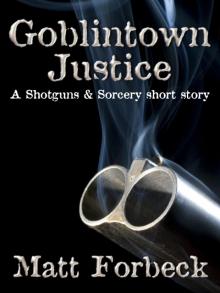 Goblintown Justice
Goblintown Justice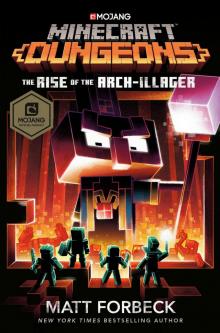 Minecraft Dungeons
Minecraft Dungeons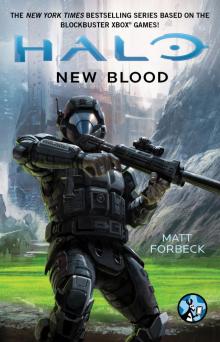 New Blood
New Blood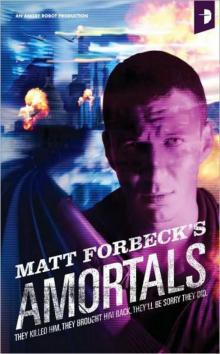 Amortals
Amortals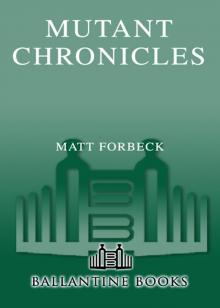 Mutant Chronicles
Mutant Chronicles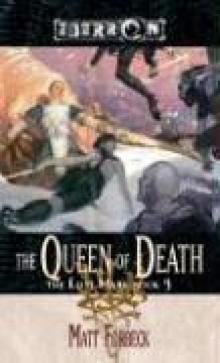 Lost mark 3 The Queen of Death:
Lost mark 3 The Queen of Death: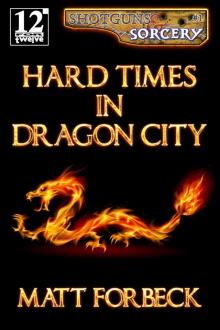 Hard Times in Dragon City
Hard Times in Dragon City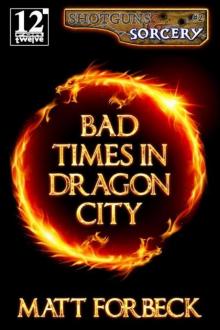 Bad Times in Dragon City
Bad Times in Dragon City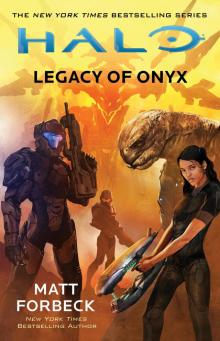 Legacy of Onyx
Legacy of Onyx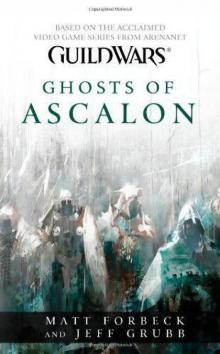 Ghosts of Ascalon (guild wars)
Ghosts of Ascalon (guild wars)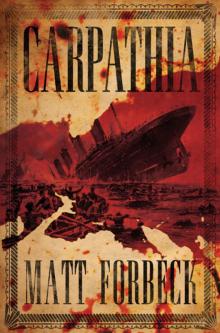 Carpathia
Carpathia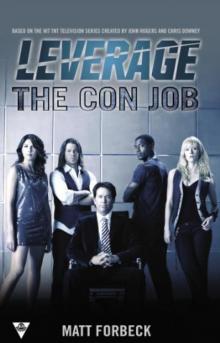 The Con Job
The Con Job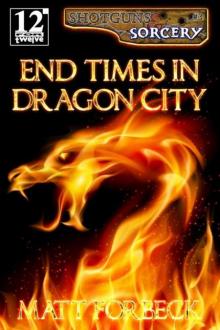 End Times in Dragon City
End Times in Dragon City